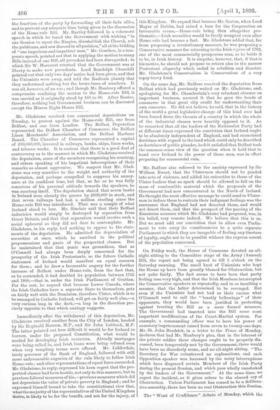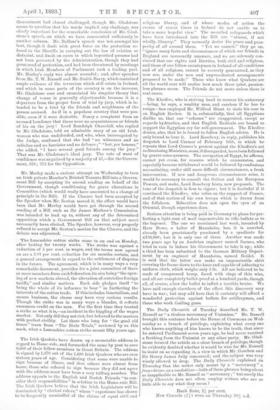The "Want of Ccnfidence " debate of Monday, which the
'Government had almost challenged, though Mr. Gladstone seems to question that his words implied any challenge, was chiefly important for the remarkable conclusion of Mr. Glad- stone's speech, on which we have commented sufficiently in -another column. Mr. Balfour's speech was not amongst his best, though it dealt with great force on the protection re- fused to the Sheriffs in carrying out the law of eviction or distraint, and dwelt on cases in which boycotted persons had not been protected by the Administration, though they had great need of protection, and had been threatened by meetings in which Irish Members of Parliament took a leading part. Mr. Morley's reply was almost scornful ; and, after speeches Tom Mr. T. W. Russell and Mr. Smith.Barry, which contained ample evidence of the terrorism which still exists in Ireland, and which in some parts of the country is on the increase, Mr. Gladstone rose and enunciated his singular theory that change of venue is generally objectionable because it is a departure from the proper form of trial by jury, which is in- tended to be a trial by the friends and neighbours of the person accused. As if in a populous country that were pos- 'sible, even if it were desirable. Fancy a complaint from an accused Londoner that there were no acquaintances or friends of his on the jury ! Lord Randolph Churchill, who replied to Mr. Gladstone, told an admirable story of an old Irish. woman who was undefended, and who, when interrogated by the Judge, confessed that she had "no witnesses and no solicitor and no barrister and no defence ; " "but, yer honour," she added, "I have several good friends among the jury." That was Mr. Gladstone's ideal jury. The vote of want of confidence was negatived by a majority of 47,—for the Govern- ment, 319; 272 for the Opposition.



































 Previous page
Previous page